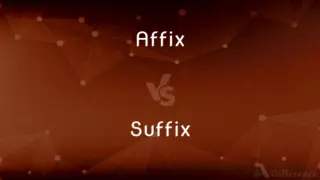Comprehension vs. Analysis — What's the Difference?
By Tayyaba Rehman — Updated on December 25, 2023
Comprehension is understanding content or a concept, while analysis is examining and breaking it down into parts to understand underlying ideas.

Difference Between Comprehension and Analysis
Table of Contents
ADVERTISEMENT
Key Differences
Comprehension involves grasping the basic meaning or essence of a text or idea. It's the ability to understand and interpret information as it is presented. Analysis, on the other hand, goes deeper, dissecting the given information to understand its components, relationships, and principles. While comprehension is about understanding what is presented, analysis is about exploring how and why things are presented as they are.
In comprehension, the focus is on understanding the literal content, such as the plot of a story or the main points of an article. This process involves recognizing and interpreting facts and ideas. In contrast, analysis requires critical thinking to examine these facts and ideas, identifying patterns, relationships, and underlying themes. Analysis often involves asking questions about the material, beyond just understanding its surface meaning.
Comprehension is a foundational skill, necessary for effective analysis. Without a clear understanding of the material, any analysis conducted would be on shaky ground. Conversely, analysis builds upon comprehension, taking the understanding to a more complex and detailed level. It often involves evaluating, comparing, and contrasting different aspects of the material.
In terms of learning and cognition, comprehension is an initial step in the process of intellectual engagement with content. It forms the basis for further intellectual pursuits such as analysis, synthesis, and evaluation. Analysis, however, represents a more advanced stage of engagement where the learner not only understands the material but also starts to break it down and explore its deeper meanings and implications.
Comprehension and analysis, while distinct, are interconnected aspects of learning and understanding. Comprehension sets the stage for analysis, and effective analysis cannot occur without a solid foundation of comprehension. Both are essential for a thorough and nuanced understanding of any content.
ADVERTISEMENT
Comparison Chart
Objective
Understanding the basic meaning or concept.
Breaking down concepts to understand components.
Focus
Grasping literal content and surface meaning.
Examining underlying structures and principles.
Process
Recognizing and interpreting information.
Critically thinking and questioning.
Level of Depth
Surface-level understanding.
In-depth exploration of content.
Outcome
Gaining knowledge.
Gaining insight and deeper understanding.
Compare with Definitions
Comprehension
Comprehension is the ability to grasp the meaning of material.
Reading a novel, she showed great comprehension of the complex themes.
Analysis
Analysis is the process of breaking down information into its constituent parts.
His analysis of the data revealed patterns not initially apparent.
Comprehension
Comprehension refers to understanding and interpreting spoken words.
His comprehension of the lecture was evident in his insightful questions.
Analysis
It involves examining and interpreting data or text to understand underlying ideas.
Through careful analysis, she uncovered the author's thematic concerns.
Comprehension
It's about understanding the context and nuances of a text.
Her comprehension of the historical context gave depth to her reading of the novel.
Analysis
Analysis is about identifying relationships and making connections.
His analysis of historical events led to a new understanding of cause and effect.
Comprehension
It involves decoding text and deriving meaning.
Her comprehension of the scientific paper allowed her to discuss its findings accurately.
Analysis
It requires critical thinking and evaluation.
Her analysis of the experiment's results challenged existing theories.
Comprehension
Comprehension is recognizing the intended message in communication.
Through careful listening, his comprehension of the foreign language improved.
Analysis
Analysis often leads to the formation of new insights or theories.
His analysis of the literary work resulted in a groundbreaking interpretation.
Comprehension
The act or fact of grasping the meaning, nature, or importance of; understanding.
Analysis
Analysis is the process of breaking a complex topic or substance into smaller parts in order to gain a better understanding of it. The technique has been applied in the study of mathematics and logic since before Aristotle (384–322 B.C.), though analysis as a formal concept is a relatively recent development.The word comes from the Ancient Greek ἀνάλυσις (analysis, "a breaking-up" or "an untying;" from ana- "up, throughout" and lysis "a loosening").
Comprehension
The knowledge that is acquired in this way.
Analysis
Detailed examination of the elements or structure of something
Statistical analysis
An analysis of popular culture
Comprehension
Capacity to include; comprehensiveness.
Analysis
Short for psychoanalysis
Other schools of analysis have evolved out of the original disciplines established by Freud
Comprehension
(Logic) The sum of meanings and corresponding implications inherent in a term.
Analysis
The separation of an intellectual or material whole into its constituent parts for individual study.
Comprehension
Thorough understanding.
Students will be tested on their comprehension of sentences in the foreign language.
Analysis
The study of such constituent parts and their interrelationships in making up a whole.
Comprehension
(logic) The totality of intensions, that is, attributes, characters, marks, properties, or qualities, that the object possesses, or else the totality of intensions that are pertinent to the context of a given discussion.
Analysis
A spoken or written presentation of such study
Published an analysis of poetic meter.
Comprehension
(programming) A compact syntax for generating a list in some functional programming languages.
Analysis
The separation of a substance into its constituent elements to determine either their nature (qualitative analysis) or their proportions (quantitative analysis).
Comprehension
(Christianity) The inclusion of nonconformists within the Church of England.
Analysis
The stated findings of such a separation or determination.
Comprehension
The act of comprehending, containing, or comprising; inclusion.
In the Old Testament there is a close comprehension of the New; in the New, an open discovery of the Old.
Analysis
A branch of mathematics principally involving differential and integral calculus, sequences, and series and concerned with limits and convergence.
Comprehension
That which is comprehended or inclosed within narrow limits; a summary; an epitome.
Though not a catalogue of fundamentals, yet . . . a comprehension of them.
Analysis
The method of proof in which a known truth is sought as a consequence of a series of deductions from that which is the thing to be proved.
Comprehension
The capacity of the mind to perceive and understand; the power, act, or process of grasping with the intellect; perception; understanding; as, a comprehension of abstract principles.
Analysis
(Linguistics) The use of function words such as prepositions, pronouns, or auxiliary verbs instead of inflectional endings to express a grammatical relationship; for example, the cover of the dictionary instead of the dictionary's cover.
Comprehension
The complement of attributes which make up the notion signified by a general term.
Analysis
Psychoanalysis.
Comprehension
A figure by which the name of a whole is put for a part, or that of a part for a whole, or a definite number for an indefinite.
Analysis
Systems analysis.
Comprehension
An ability to understand the meaning or importance of something (or the knowledge acquired as a result);
How you can do that is beyond my comprehension
He was famous for his comprehension of American literature
Analysis
(countable) Decomposition into components in order to study (a complex thing, concept, theory etc.).
Comprehension
The relation of comprising something;
He admired the inclusion of so many ideas in such a short work
Analysis
(countable) The result of such a process.
Analysis
The mathematical study of functions, sequences, series, limits, derivatives and integrals.
Mathematical analysis
Analysis
Proof by deduction from known truths.
Analysis
The process of breaking down a substance into its constituent parts, or the result of this process.
Analysis
The analytical study of melodies, harmonies, sequences, repetitions, variations, quotations, juxtapositions, and surprises.
Analysis
Psychoanalysis.
Analysis
A resolution of anything, whether an object of the senses or of the intellect, into its constituent or original elements; an examination of the component parts of a subject, each separately, as the words which compose a sentence, the tones of a tune, or the simple propositions which enter into an argument. It is opposed to synthesis.
Analysis
The separation of a compound substance, by chemical processes, into its constituents, with a view to ascertain either (a) what elements it contains, or (b) how much of each element is present. The former is called qualitative, and the latter quantitative analysis.
Analysis
The tracing of things to their source, and the resolving of knowledge into its original principles.
Analysis
The resolving of problems by reducing the conditions that are in them to equations.
Analysis
A syllabus, or table of the principal heads of a discourse, disposed in their natural order.
Analysis
The process of ascertaining the name of a species, or its place in a system of classification, by means of an analytical table or key.
Analysis
An investigation of the component parts of a whole and their relations in making up the whole
Analysis
The abstract separation of a whole into its constituent parts in order to study the parts and their relations
Analysis
A form of literary criticism in which the structure of a piece of writing is analyzed
Analysis
The use of closed-class words instead of inflections: e.g., `the father of the bride' instead of `the bride's father'
Analysis
A branch of mathematics involving calculus and the theory of limits; sequences and series and integration and differentiation
Analysis
A set of techniques for exploring underlying motives and a method of treating various mental disorders; based on the theories of Sigmund Freud;
His physician recommended psychoanalysis
Common Curiosities
What is the primary goal of comprehension?
The primary goal of comprehension is to understand and interpret the meaning of a text or spoken words.
Is comprehension always the first step before analysis?
Yes, comprehension is typically the first step, providing the necessary understanding for analysis.
How does analysis differ from comprehension?
Analysis goes beyond understanding to dissect and examine parts of the content, seeking deeper understanding.
Can you have analysis without comprehension?
No, effective analysis requires a solid foundation of comprehension.
What skills are involved in comprehension?
Comprehension involves skills like reading, listening, interpreting, and contextual understanding.
What are some techniques to improve comprehension?
Techniques include active reading, summarizing content, and asking clarifying questions.
Can analysis change one's comprehension of a text?
Yes, analysis can provide deeper insights that may alter or enhance initial comprehension.
How can analysis be applied in everyday life?
Analysis can be used in problem-solving, decision-making, and understanding complex issues.
What role does critical thinking play in analysis?
Critical thinking is central to analysis, as it involves evaluating and questioning content.
How important is background knowledge in comprehension?
Background knowledge is very important as it provides context and aids in understanding.
Is it possible to over-analyze a text?
Yes, over-analysis can occur, leading to convoluted or overly complex interpretations.
How does one balance comprehension and analysis in learning?
Balance is achieved by first establishing a solid understanding, then moving to deeper analysis while revisiting comprehension as needed.
Are there different types of comprehension?
Yes, including literal, inferential, and evaluative comprehension.
What is the end goal of analysis?
The end goal of analysis is to gain a deeper, more nuanced understanding of the content.
Can comprehension be subjective?
Yes, comprehension can be influenced by personal experiences and perspectives.
Share Your Discovery

Previous Comparison
Urdu vs. Punjabi
Next Comparison
Affix vs. SuffixAuthor Spotlight
Written by
Tayyaba RehmanTayyaba Rehman is a distinguished writer, currently serving as a primary contributor to askdifference.com. As a researcher in semantics and etymology, Tayyaba's passion for the complexity of languages and their distinctions has found a perfect home on the platform. Tayyaba delves into the intricacies of language, distinguishing between commonly confused words and phrases, thereby providing clarity for readers worldwide.












































